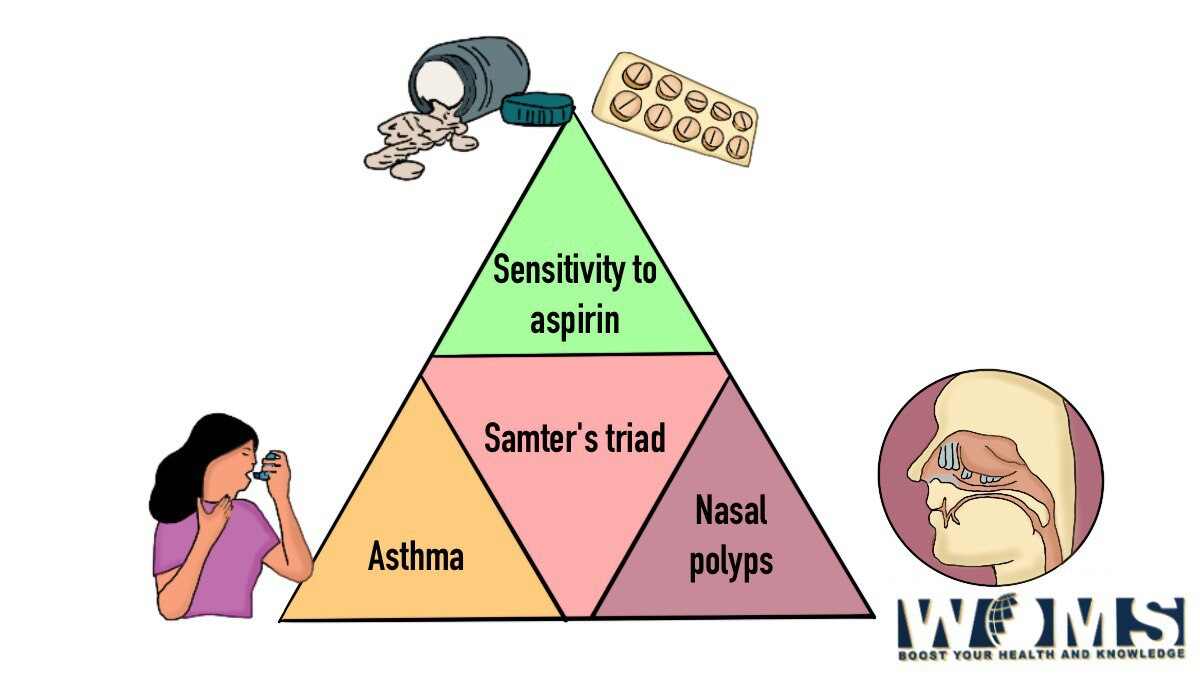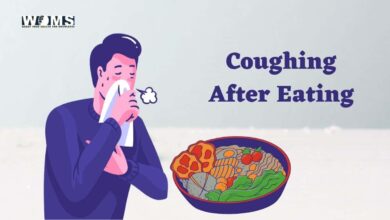A Samter’s triad: A Medical Condition That Requires a Multi-Disciplinary Approach

Samter’s triad is a chronic condition known as aspirin-exacerbated respiratory disease (AERD). It typically includes three common symptoms most commonly found in several patients. The triad of symptoms includes asthma, sinus inflammation with nasal polyps recurrence, and aspirin sensitivity. People with respiratory diseases usually have different kinds of allergies.
What is the pathophysiology of Samter’s triad?
Patients with Samter’s triad are allergic to aspirin and NSAIDs medication. When they take any form of aspirin or NSAIDs, it induces an adverse reaction in these patients. This adverse reaction can affect both upper and lower respiratory airways. Therefore, they need to avoid aspirin and NSAIDs to prevent any reaction.
Difference between Samter’s triad and true allergy
There is a difference between the allergic reaction and Samter’s triad. Let us have a look at the difference between them.
| True allergy | Samter’s triad (pseudo allergy) |
| A true allergy is a usual response by immunoglobulin E that reacts to a foreign body to induce allergic effects. | Aspirin and NSAIDs block the cyclooxygenase1 enzyme, which leads to excess production of leukotrienes. As a result, it produces severe allergy-like effects. |
| It uses antibodies to induce the signs and symptoms. | There is no role for antibodies. |
What are the signs and symptoms of Samter’s triad?
Samter’s triad usually presents asthma, sinus inflammation, and recurring nasal polyps. Usually, these symptoms don’t show any response to standard therapy. In addition, people with asthma and nasal polyps are advised not to use aspirin even if they never exhibit any reaction to aspirin intake. Samter’s triad produces a similar effect to allergic reactions.
Symptoms of adverse reaction after taking aspirin
Patients exhibit a series of typical symptoms after taking aspirin or aspirin-related drugs. The symptoms can last for 30 to 120 minutes. Aspirin intake can affect both the upper and lower respiratory tracts. Some of these symptoms are as follows:
- Continuous coughing
- Wheezing sound
- Tightness in the chest
- Headache
- Sinus pain with inflammation
- Nasal congestion
- Sneezing
- Abdominal pain
- Rashes
- Flushing skin
- Diarrhea and vomiting
- Loss of smell sensation in 70% of patients.
How to diagnose Samter’s triad?
There are no such specific tests to diagnose patients with Samter’s triad. The only way to diagnose is its symptoms of asthma, nasal polyps, and aspirin sensitivity. In addition, there is a test for the confirmation of aspirin sensitivity named the Aspirin Challenge test. This test is usually for the confirmation of patients with Samter’s and is done under supervision.
Blood chemistry
Patients with Samter’s triad have a greater count of eosinophils in blood or nasal polyps. Eosinophils indicate an active infection. They are immune cells produced as a result of infection.
What are the treatment protocols for Samter’s triad?
The most important thing is to prevent aspirin and NSAID intake due to any cause. It may worsen your condition in several ways. Moreover, there is a symptomatic treatment for this disease.
- For asthma, there are inhalers and sinus rinses to control respiratory symptoms and sinus inflammation with improved symptoms.
- Steroid injections are also in use for the treatment of nasal polyps. In addition, there may be a need for surgery to remove nasal polyps according to the severity.
There are some other options available for the treatment of Samter’s triad symptoms. You can go for these options for a better and more compliant treatment plan. Let us have a look at these treatment approaches for a better review of details.
Aspirin desensitization
This treatment plan provides tolerance to aspirin making the patients more vulnerable to aspirin sensitivity. The doctor suggests a slow and lower dose of aspirin until the patient gets resistant to aspirin sensitivity. This procedure adapts the body’s response to aspirin in slower doses. In these cases, patients need to be hospitalized until the recommended dose of aspirin causes no harm to the patient.
This treatment plan is important for patients who need to take aspirin or NSAID medication for cardiovascular diseases. Moreover, this process helps to improve asthma and reduces the recurrence of nasal polyps.
Avoid aspirin and NSAID medications
Patients who can’t go for aspirin desensitization must avoid aspirin in any form. The best treatment for such patients is to avoid aspirin and NSAIDs for any reason.
Nasal surgery
Nasal surgery is also a treatment option for the removal of nasal polyps. Oral steroids are the common treatment plan for nasal polyps. Nasal surgery is not a permanent treatment plan. Because nasal polyps grow back due to recurrence.
Other treatment plans
There are leukotriene-modifying agents that can reduce inflammation in the airway tracts. In addition, these drugs enhance lung functions, reduce asthma flare-ups, and decrease eosinophils in nasal polyps.
Avoiding salicylic acid-containing foods may help to improve symptoms. As salicylic acid is the main component of aspirin.
Conclusion
Samter’s triad is a combination of symptoms that can affect the upper and lower respiratory tracts. In addition, it is a pseudo-allergic response to aspirin and NSAID medications. These medications induce a severe response with many signs and symptoms. In this way, aspirin intake may prove damaging in these patients. Moreover, these symptoms don’t follow conventional medical treatment.
Samter’s triad is a chronic indication of asthma, sinus inflammation, recurring nasal polyps, and aspirin sensitivity. These symptoms need to be treated as soon as possible to prevent any fatal condition. There are several treatment options for the management of Samter’s triad symptoms. The foremost treatment is to prevent aspirin and NSAID intake.
FAQs
What is aspirin sensitivity?
Aspirin sensitivity is usually known as the severity of allergic symptoms after 30 minutes to 3 hours of aspirin intake. Mild intake may induce Mild symptom severity. It depends on the dosage of the aspirin and related anti-inflammatory drugs.
Is AERD a fatal disease?
AERD is a chronic disease with ongoing severe respiratory symptoms. These symptoms need to be managed properly with appropriate medication. But, unfortunately, these symptoms don’t respond to conventional therapies. It can affect the quality of life. Moreover, it is also difficult to find the right treatment plan for this medical condition.



